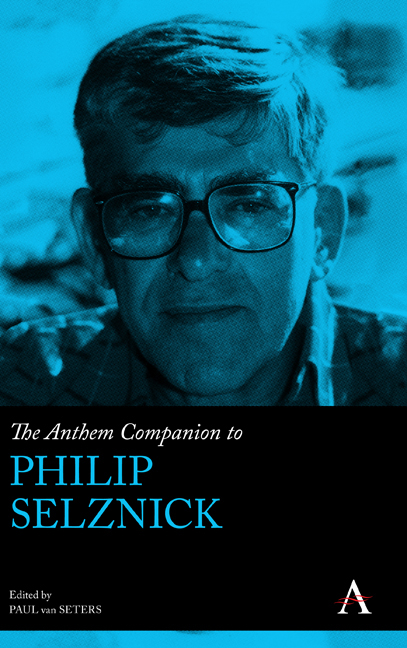Book contents
- Frontmatter
- Contents
- List of Contributors
- Chapter 1 The Intellectual Enterprise We Call Sociology
- Chapter 2 Philosophy for the Twice-Born: Selznick and Dewey in Dialogue
- Chapter 3 Power Relations across Organizations and Fields: Building on Selznick’s Concepts of Co-Optation and Institutionalization
- Chapter 4 Organizations, Institutions, and Law: The Sociological Significance of Philip Selznick’s Law, Society, and Industrial Justice
- Chapter 5 Post-Industrial Justice? Normativity and Empiricism in a Changing World of Work
- Chapter 6 The Promise of the Rule of Law Ideal
- Chapter 7 Philip Selznick on Law and Society: Democratic Ideals, Communitarianism, and Natural Law
- Chapter 8 Selznick’s Concepts of Culture and Community
- Chapter 9 A Symposium on The Moral Commonwealth
- Chapter 10 An Ecumenical Sensibility
- Index
Chapter 1 - The Intellectual Enterprise We Call Sociology
Published online by Cambridge University Press: 19 October 2021
- Frontmatter
- Contents
- List of Contributors
- Chapter 1 The Intellectual Enterprise We Call Sociology
- Chapter 2 Philosophy for the Twice-Born: Selznick and Dewey in Dialogue
- Chapter 3 Power Relations across Organizations and Fields: Building on Selznick’s Concepts of Co-Optation and Institutionalization
- Chapter 4 Organizations, Institutions, and Law: The Sociological Significance of Philip Selznick’s Law, Society, and Industrial Justice
- Chapter 5 Post-Industrial Justice? Normativity and Empiricism in a Changing World of Work
- Chapter 6 The Promise of the Rule of Law Ideal
- Chapter 7 Philip Selznick on Law and Society: Democratic Ideals, Communitarianism, and Natural Law
- Chapter 8 Selznick’s Concepts of Culture and Community
- Chapter 9 A Symposium on The Moral Commonwealth
- Chapter 10 An Ecumenical Sensibility
- Index
Summary
Introduction
Philip Selznick (1919–2010) was one of the preeminent sociologists of his time. He is widely recognized for his major contributions to a number of fields, including general sociology, sociology of organizations, industrial sociology, sociology of law, and moral sociology. He was professor of sociology (and later professor of law and sociology) at the University of California (UC), Berkeley, from 1952 until his retirement in 1984. He founded the Center for the Study of Law and Society (in 1961) and the Jurisprudence and Social Policy (JSP) Program (in 1978), both at UC Berkeley. The Law and Society Center and the JSP Program are still thriving and over the years have brought legions of students and scholars from all over the world to Berkeley.
This opening chapter of the Anthem Companion to Philip Selznick is organized as follows. The first section presents biographical information on Selznick's family situation and his experiences in childhood and early youth in Newark. This information helps us to understand his intellectual formation and predisposition. The second section and the third section focus on his years in college and graduate school in New York City, from 1935 to 1942. In this period, both his academic and his political interests became manifest. The fourth section explores Selznick's lifelong commitment to a broad perspective of what sociology as an academic discipline could and should be. This broad perspective stands out most significantly in what he himself considered his magnum opus, The Moral Commonwealth (1992). In the fifth and final section, the discussion turns to Selznick's last book, A Humanist Science (2008), in which he argues that sociology is both a “humanist science” and a branch of “public philosophy.” In contemporary sociology, there have been lively debates on “public sociology.” Some of that literature is quite critical of the work of Selznick. What is the relation between public sociology and public philosophy? This chapter ends with an attempt to answer that question.
Growing Up in Newark
Selznick was born in 1919, in a working-class family in Newark, in northeastern New Jersey. He had a sister, his only sibling, who was two years older.
- Type
- Chapter
- Information
- The Anthem Companion to Philip Selznick , pp. 1 - 22Publisher: Anthem PressPrint publication year: 2021

